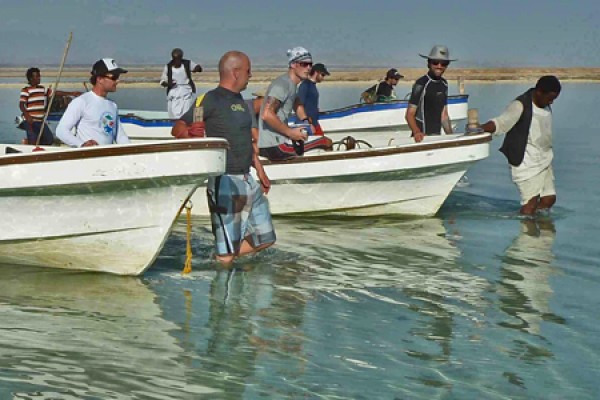 Research associate Nigel Hussey (fourth from left) and his team ventures out into the Red Sea.
Research associate Nigel Hussey (fourth from left) and his team ventures out into the Red Sea.
Ecological conservation shouldn’t be derailed by economic sanctions dictated by politics, says a UWindsor researcher whose commentary on the subject has been published by the journal Nature.
Nigel Hussey wants you to think of pristine marine and terrestrial wildlife resources when you think of Sudan. But first, Sudan needs greater access to conservation funding and that’s proving to be a struggle because of economic sanctions imposed on the country.
Dr. Hussey, a research associate in the Great Lakes Institute for Environmental Research, has been studying sharks and rays in the northeastern African nation since 2007.
“It’s very complicated to get funding for conservation research in politically unstable countries,” he said. “Basically you can rule out most global funding initiatives.”
This complicated funding situation means few people know about the Red Sea’s flourishing coral reefs off the Sudanese coast.
“We call it the ‘hidden jewel’ because basically nobody is even aware of these absolutely unbelievable wildlife resources sat off the Sudan coastline,” said Hussey. “Instead when most people think of Sudan their first thoughts are of war, human rights atrocities and terrorism.”
This frustration inspired Hussey to write his commentary.
“Getting this point published in Nature hopefully raises awareness of the potential of these incredible natural resources that we’ve got on our planet and the need to decouple political agendas from conservation priorities,” he said. “And if we can do that then we’ve got a much greater chance of achieving our global conservation and biodiversity goals.”
Hussey—in conjunction with the Cousteau Society and the Sudanese Development Initiative—and project partners the Wildlife Administration, the Red Sea State Government and the Red Sea University, were recently awarded a Darwin Initiative grant from the UK government to continue marine conservation in Sudan linked with poverty alleviation.
